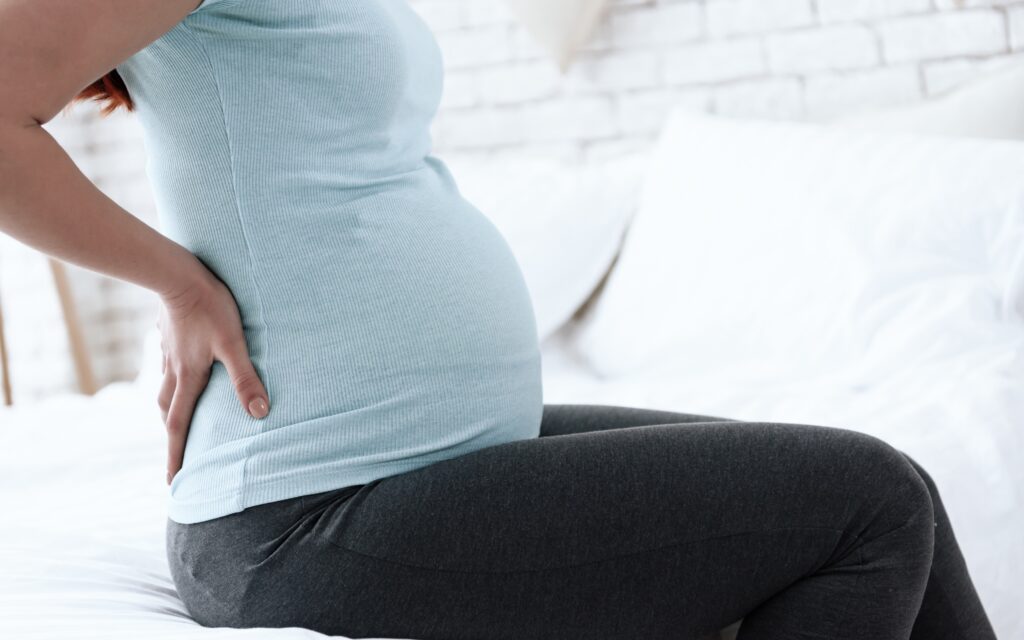We all know sleeping in pregnancy can be a real challenge. Can you sleep with a weighted blanket while pregnant? What does using a weighted blanket in pregnancy do for your baby – and can it help you to overcome the common issues, you have with poor sleep? These are all common questions for expectant mothers. Read on to find the answers.
In any stage of life, sleep deprivation is a dangerous thing. We need plenty of sleep to help us recover from the challenges of the day and prepare for the day ahead.
Sleep is crucial for growth, healing, and general wellbeing. When you’re pregnant, your sleep is supporting not just you – but your growing child too.
Lack of sleep during pregnancy is has been linked to various complications. Unfortunately, getting a good night’s sleep when your body is in a state of constant change, is easier said than done. This is where your option of a weighted blanket comes in.
Weighted blankets are excellent for promoting natural relaxation, using “deep pressure stimulation” to increase melatonin (the sleep hormone). Serotonin (the mood-boosting hormone) is also enhanced, whilst cortisol (the stress hormone) is reduced. But is it safe to use a weighted blanket when pregnant?
Using a weighted blanket for pregnancy sleep is safe
Sleep is twice as important for the average pregnant woman. Just as you’re “eating for two” whenever you consume your carefully planned meals, you’re also “sleeping for two”.
During the early stages of pregnancy, sleeping can feel pretty straightforward. You’ll often feel more tired, because your body will be using a lot of energy to help grow the fetus in your womb.
Unfortunately, during the later periods of your pregnancy, no matter how tired you may feel, you might not be able to get to sleep in your normal position. Some women even start to sleep sitting up.
Surveys show the majority of women experience a reduction in their ability to sleep at night during the third trimester. For most of the respondents, trouble sleeping is caused by discomfort in pregnancy. Using a weighted blanket to calm down your nervous system with “deep pressure stimulation” might be a solution.
Other issues making it harder to sleep during pregnancy can include:
- Sleeping position: As your baby continues to grow, it becomes harder to find a comfortable position where you can sleep without putting too much pressure on your bump.
- Bathroom visits: Increased pressure on the bladder means more trips to the bathroom. The more you have to get up during the night, the worse you’ll sleep.
- Heartburn: Indigestion and heartburn are common problems for women during the second and third trimester. This can make it much harder to sleep.
- Aches and pains: As your body goes through various changes to prepare for the arrival of your new child, you’ll find yourself suffering from everything from shortness of breath to backache, leg cramps, and general feelings of nausea.
- Stress and anxiety: Pregnant women frequently feel panic and stress about everything from not being ready for the birth, to how painful it’s going to be. These worries can keep you up at night.
With so many issues getting in the way of a good night’s sleep, it’s little surprise women might consider using all the tools available to them for a good night’s rest.

The benefits of a weighted blanket in pregnancy
Weighted blankets are effective at serving several different functions, from reducing stress and anxiety, to providing a sense of comfort and security when we need it most. With a luxurious weighted blanket, you can access the benefits of “deep pressure stimulation”.
Deep pressure stimulation, otherwise known as Deep Touch Pressure therapy, involves gently applying pressure to the body in specific locations. Firm, controlled pressure can help to induce feelings of calmness, which prompt:
Comfort
Weighted blankets are said to have a similar impact to the process of swaddling newborns tightly in a blanket when they need to sleep. Many people find these blankets make it easier for them to doze off, by giving them a sense of security.
Relaxation
Deep pressure stimulation can help to promote the release of serotonin – the mood boosting hormone, while reducing the stress hormone – cortisol. With a weighted blanket, you essentially soothe way anxiety and stress which might interfere with your sleep and set yourself up for a better evening of rest.
Good sleep quality
Weighted blankets can improve sleep quality by helping to promote the release of melatonin too – the substance which regulates your circadian rhythm and your ability to sleep. A weighted blanket can reduce the cortisol which keeps you alert, while ensuring you have plenty of melatonin to ease you into sleep.
Can I use a weighted blanket while pregnant?
So, can you sleep with a weighted blanket while pregnant? The simple answer for most women is “yes”. There isn’t any evidence to suggest using a weighted blanket is dangerous for your baby.
However, as with most things, it’s worth speaking to your doctor before you begin using a weighted blanket. Just to be sure – they’ll know more about your body and your baby’s needs.
If using a weighted blanket is deemed safe by your doctor, there are actually a number of benefits to using these tools, when you’re pregnant. While you may be worried about the idea of placing weight on top of your stomach when you’re pregnant, the reality is these blankets only weigh about 10% of your overall weight.
Sometimes, weighted blankets can also help to reduce some of the specific side effects of pregnancy, which might interfere with your sleep. A weighted blanket can help to reduce inflammation and swelling, which can also lead to pain and discomfort around your joints and extremities.
As weighted blankets grow more popular, there are also a number of kinds available on the market to suit different needs. For instance, you can get cooling weighted blankets, which help you to maintain the right temperature when you’re resting.
As many expectant mothers know, it can be very difficult to maintain a comfortable temperature when you’re pregnant. Here are some great weighted blankets worth trying, if you want to experience the benefits yourself.
- Waowoo premium weighted blanket (Queen)
- Weighted Idea (cooling) weighted blanket
- Qusleep calming weighted blanket

Who should not use a weighted blanket?
If you’re wondering “what are the negatives of weighted blankets?” there are a few potential issues to think about. While weighted blankets are mostly safe for use, they can cause problems if you have a chronic respiratory condition, or you’re struggling with your breathing as a result of pregnancy.
It’s also worth noting weighted blankets aren’t recommended for people with obstructive sleep apnea. Make sure you speak to your doctor, before you begin using one of these blankets. If you’re going to be using a weighted blanket while pregnant, ensure:
- It’s no more than 10% of your full body weight
- You’re not claustrophobic (as this might cause anxiety for you)
- You have the full approval of your doctor
If your doctor approves the use of a weighted blanket, it may be a safer alternative to things like medications and drugs to help with things like relaxation and insomnia. As an aid for sleep, it’s generally much better to use a weighted blanket, than to rely on other methods, like sleeping pills, which may not be safe for consumption during your pregnancy.
Using a weighted blanket while pregnant
Using a weighted blanket while pregnant can feel like a risk to the baby. However, the reality is it’s much safer than you think. There aren’t any specific dangers we know of associated with using weighted blankets in pregnancy. However, it is worth remembering all people are different, and you might respond differently to a blanket, than other women.
If you’re struggling with poor sleep, a weighted blanket could be an excellent way to get your rest and relaxation back on track. Speak to your doctor about your options and consider weighted blankets only when you know they’re safe for you. You might consider using a more lightweight blanket to begin with, then gradually progressing to one that’s up to ten percent of your body weight.
Don’t forget, there are other steps you can take to improve your sleep during pregnancy. Maybe get a pregnancy pillow to help keep you situated in a comfortable position or use meditation for relaxation before you try to go to sleep.
Siestio. Sleep Matters.
Medical disclaimer
You must not rely on the information provided on our website as an alternative to medical advice from your doctor or other healthcare professionals. For more information read our full disclaimer here.







